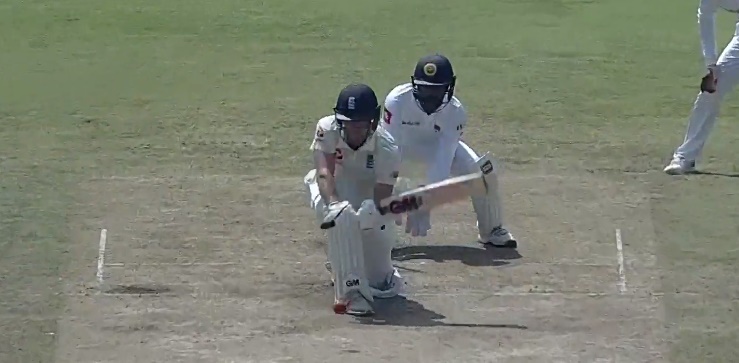
We haven’t seen so much sweeping since we tore down that dividing wall and knocked off all the plaster in the kitchen.
Question is, does sweeping work?
Sri Lanka v England at Pallekele 2018 is the sweepiest match we can remember. At the time of writing, seven of nine second innings England wickets have fallen to the shot or its reverse sibling.
People are being unusually forgiving of this at the minute, which is because England are some way ahead. A narrower lead and there’d be angry demands that batsmen ‘dig in’ or ‘play properly’. The proof of the pudding is in the match result, we suppose. This means they’re probably one day of poor bowling away from being pilloried for their batting approach.
Proactive batting is something we’re fundamentally in favour of. Viewed over an appropriate timespan, it is not playing irresponsibly. It is calculated risk for the greater good.
This is the long and short of it. This is the thing to remember. Proactive batsmen take more risks, but they do so to try and reduce the risk for both themselves and also their batting partners further down the line.
Playing each ball on its merits is almost universally regarded to be a good thing, but there are times when it’s far more important to play the situation on its merits. A passive, reactive approach looks determined and gritty in the short term, but it doesn’t change anything. It doesn’t change the score and it doesn’t change the field settings either.
Has England’s sweeping been working? Well, they’re ahead in the game and they’ve probably made more runs than most people expected them to. At the same time, their second innings top-scorer, Joe Root, seems to have been a bit less sweepy than his team-mates. Maybe that says something.
Sweeps and reverse sweeps are very obvious signals of proactivity, but if batsmen fixate on them, they become predictable. If we as viewers fixate on them, we overlook all the other forms of proactivity that were so expertly exhibited by Root.
There’s also a danger that the entire team seems to have settled on the same approach. Just as an entire team of passive, reactive batsmen are liable to succeed and fail collectively, so too are a team all bent on imposing themselves on the opposition.
That said, there is of course a third option and Trevor Bayliss has long maintained that it is the greatest batting danger of all. It is the danger of falling between two stools.


I miss New Zealand’s Neil Broom. He wasn’t very good, but I’d chuckle every time he was out sweeping.
Foakes has also been slightly less sweepier. Can probably split it into 4 groups.
Quickest on feet, so sweepy but not overly so – Root, Foakes, Curran
Players that need a gameplan, Gameplan A has been designated as “sweep”, so very sweepy – Stokes, Burns, Moeen, Leach
Good sweepers, so very, very sweepy – Buttler, Jennings, Anderson
Adil Rashid
I guess the key question is thus – If England batted in any other way, would they score more runs? I’m fairly confident the answer is no . I think sweeping the shit out of everything has its limitations (namely you keep getting out to the sweep shot), but at the same time you can’t expect these players to turn into Rahul Dravid just because you are playing in the subcontinent.
Why does Rash get a first name but the others don’t?
Oy aint seen thems many sweeps since Mary Poppins…
https://youtu.be/kG6O4N3wxf8
…and there’s no mistake.
SuperKaluwitharanaMoeenAliDocious
Shut up.
https://youtu.be/irL7ZCq7l2A
Play a sweep on its merits
In similar news, Daisy’s idiosyncratic hearing of Southern Asian names as English names…
…of which “Sir Alf Ganguly” remains somewhat of a pinnacle…
…has swept new depths, when this morning Daisy decided that, with a name like Dick Weller, the Sri Lankan sweeper-keeper should be playing for England.
I wonder whether Dick Weller is related to the musician Paul Weller?
Dan Norcross referred to his dismissal as a ‘Big swinging Dickwella’, which I thought was excellent.
https://www.kingcricket.co.uk/mohammad-abbas-could-get-hold-of-your-phone-number-and-so-could-naseem-shah/2018/10/17/
You are nothing if not consistent, Sam!
It’s not true that the shots being played is entirely the decision of the batting side. Lakmal could have cut off those areas of the field but he didn’t, because he thought (reasonably) that the England batsmen were more likely to get out sweeping than they would be if there were gaps for one in front of square for the spinners.
This is one of those game theory like cases where both parties making the calculated decision results in one outcome.
That’s a very good point.